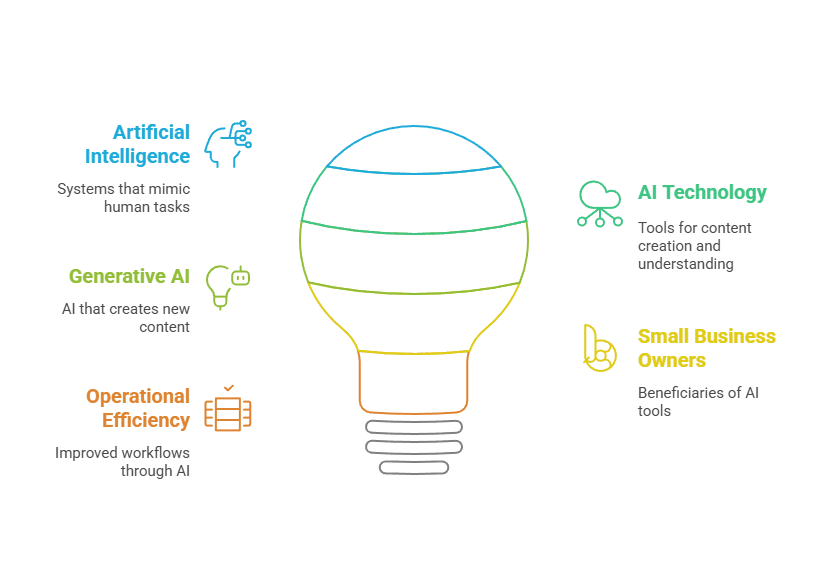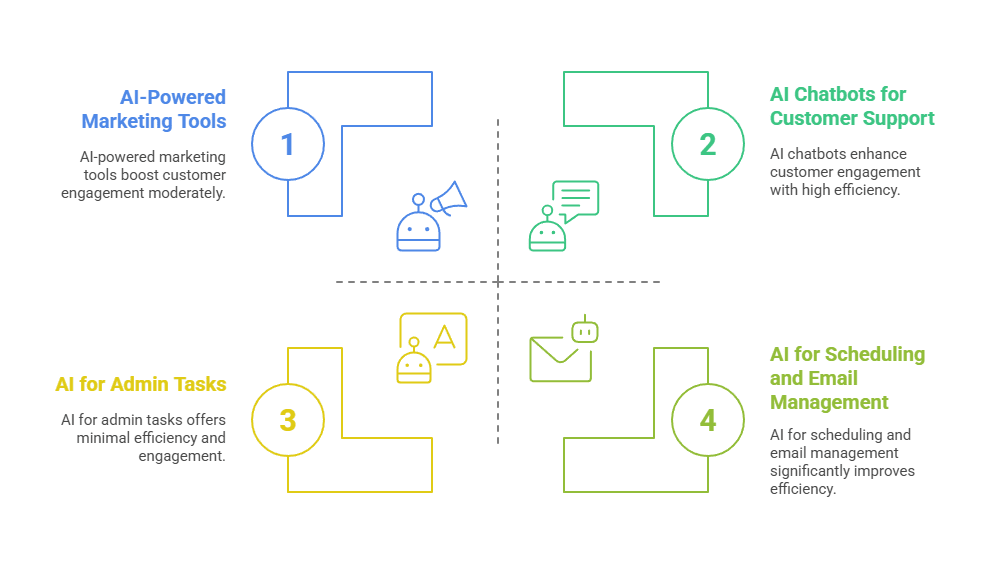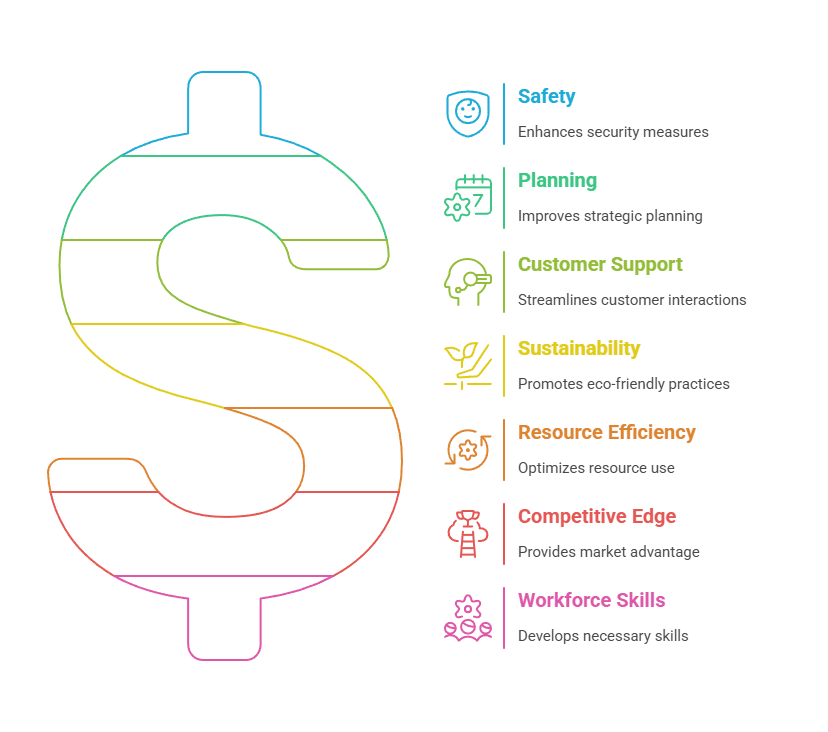Practical AI for Small Businesses – A Real Guide That Works
Welcome to the guide that helps small business owners use artificial intelligence. Learn how to use practical AI for small businesses to streamline operations, improve marketing efforts, and create smarter systems. Many small businesses can use AI to save time and grow faster. For real-world examples of automation that already work, explore AI automation tasks small businesses can implement today.
This guide offers clear tips and best practices for adopting AI in your small business. If you want to reduce busywork and focus on what matters most, this guide is for you.
Why Practical AI for Small Businesses Matters
Small businesses don’t need flashy tools or complicated platforms. They need practical AI — tools that solve real problems, cut the busywork, and help people work smarter. This isn’t about future tech. It’s about doing more with what you already have.
Understanding AI and Its Benefits
Artificial intelligence uses smart systems to do tasks that normally need people. These tasks include learning, problem-solving, and decision-making. AI technology can also understand and create content, like text, images, or code.
Generative AI is a part of artificial intelligence that creates new content. AI tools like this can help small business owners get more done with less effort. Many small businesses can use AI to improve how they work every day.
How AI Can Help Small Business Operations
AI can help businesses by saving time, cutting costs, and improving customer service. For example, AI algorithms can study data to find trends and help small business owners make smart decisions.
AI chatbots can answer questions so your team can focus on harder tasks. When small businesses implement AI, they improve how they work and serve customers.
Benefits of Using AI in Small Businesses
Using AI tools gives small businesses real advantages. These tools help businesses automate simple tasks like data entry, scheduling, and inventory. This saves time and helps teams work on more important things.
Artificial intelligence tools can also find ways to make things better. AI chatbots offer 24/7 support, making customers feel heard. Small businesses that adopt AI can work faster and serve better, which helps them grow.
Identifying Where AI Can Help Your Business
Streamline Admin Tasks with AI Tools
One of the best ways to use AI is to fix admin tasks. These jobs take time away from your team. AI tools powered by AI, like robotic process automation, can manage data entry and reports.
These tools reduce mistakes and speed up your work. AI allows teams to focus on more important work. Many small businesses use AI to simplify scheduling, emails, and meeting setup. This makes things easier and cuts costs.
Improve Customer Service with AI Chatbots
The power of AI shines in customer support. AI chatbots can answer questions any time, help customers solve problems, and give fast responses. These tools help small businesses offer better service with less effort.
AI chatbots also learn from data. They can offer personal tips and find what customers need faster. When you use AI to help customers, you build trust and improve loyalty.
Use AI to Grow Marketing and Sales
Marketing takes time, but AI can help. AI-powered tools study customer actions and create better marketing plans. AI algorithms can guess what customers might do next. This helps you send the right message to the right people.
AI systems can also run email campaigns, manage ad budgets, and track results. These tools help businesses work smarter. When you leverage AI in marketing, you improve results and make better use of time.
Best Practices for Implementing AI in Your Small Business
Choose the Right AI Tools
Choosing the right AI tool starts with one thing, knowing what you actually need. Practical AI for small businesses means solving real problems, not adding complexity. Do you want to help customers, fix admin work, or grow your marketing? Choose tools that match your goals.
Look at how the tool works, how much it costs, and how well it fits your systems. Read reviews. Ask other small business owners what AI tools work for them. When you choose the right AI, you set yourself up for success.
Steps to Add AI to Your Workflow
Start small. Use a practical AI tool on one task that slows you down every day. Something like auto-scheduling or quick responses to leads. Make sure your team knows how to use AI tools and understands how the AI system works.
Watch the tool. See if it helps. Make small changes to get better results. Let your team know why you are adopting AI. This helps build support and trust.
AI can help businesses when used with a clear plan.
Measure the Impact of AI
To see if AI is helping, track your progress. Pick a few goals like more sales, fewer errors, or better service. Measure before and after using AI.
Use AI tools to create reports and find insights. Keep checking your results and make changes to improve.
Remember, the goal is not just numbers. The goal is to use AI to make smart moves that support your business.
Real-World Use Cases of AI in Small Businesses
AI in Inventory Management
AI tools help small businesses manage stock. Practical AI makes it easy to avoid overordering and keep high-demand items ready to go. A small bookstore could use AI to find out what books will sell most. This keeps shelves full and avoids wasted space.
AI can study trends and help owners make better choices. Many small businesses already use AI like this to keep things simple and smart.
AI for Personalized Customer Experience
A boutique store can use AI to study what people buy and send more relevant offers. This kind of practical AI keeps customers engaged without adding more work to the team. The store can then send helpful product tips based on what customers like.
AI chatbots also help customers quickly. This makes people feel cared for. Small businesses that use practical AI to personalize service often see more sales and repeat customers.
AI for Financial Management
A small accounting firm can use AI to manage money tasks. This includes invoices, budgets, and receipts. AI helps find problems, sort data, and save time.
AI allows businesses to find key trends and make better money decisions. Many small businesses use AI-powered tools to improve their financial systems.
Embrace AI: What’s Next for Small Businesses
New AI Tools for Small Business Owners
More AI tools are being built for small businesses. These tools are easier to use and cost less than before. Some tools help with safety, planning, and customer support.
As AI technology gets better, small business owners can do more with fewer resources. When you use AI to streamline daily work, you give yourself a competitive edge.
AI for a Greener Business
AI can help your business be more green. AI tools can reduce waste and use energy better. For example, AI algorithms can track your power use and suggest ways to cut costs.
AI systems can also help plan routes or track products to reduce fuel use. Small businesses that use AI to improve sustainability also appeal to customers who care about the environment.
Skills for an AI-Powered Future
AI will change work, but it will not replace human thinking. Business owners need to teach teams how to work with AI. Skills like problem-solving, creativity, and teamwork will still matter.
AI tools can support training programs. Employees who understand AI will work better with these systems. Many small businesses can benefit from AI by building teams that are ready for change.
Your Next Step
Still using old systems? Start small and build momentum. Practical AI for small businesses means starting with what actually works, not overhauling everything. AI can help you cut the busywork and focus on growth.
Take the free AI Readiness Assessment. It shows where you can benefit from AI right now.
If you want real results, practical AI is how small businesses stay competitive without burning out their teams.




